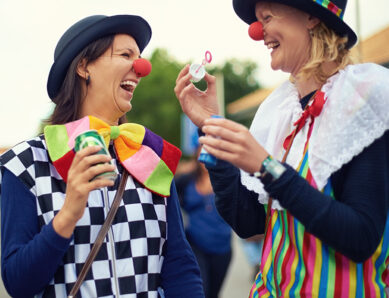About 3,000 years ago, King Solomon warned us, “Keep your eyes straight ahead; ignore all sideshow distractions.” In 2015, the Chicago Tribune’s top 10 list of distractions ended with, “The most mind-blowing fact about distractions is that almost no one could possibly imagine… oh, look, it’s a cat video!”
Dealing with distractions has always been important. Nicholas Carr found that, in 2000, the average amount of time we could stay focused on one task without our mind wandering to something new was 12 seconds. Today, it’s eight. Joshua Becker comments, “The information age may be literally rewiring our brains.”
This rewiring may take a while, so let’s look at some things we can do in the meantime.
Attention and distraction are at opposite ends of a spectrum. We are certainly pushed toward distraction by the web, mobile devices, big data, 24/7 news, and social media. This follows a period of moving into fast-paced urban life and the relentlessness of marketing and advertising.
Referring to our “attention economy,” Antony Funnell advises:
- Getting distracted isn’t the issue. You can’t avoid distraction. It’s how you manage the next moment that matters – attend to it or get back to it later.
- Avoid multi-tasking. It may seem that you’re only distracted for a minute or two, but it will be a lot longer before you are at full attention again.
- Don’t think of paying attention as a battle or a negative task. As soon as you hate doing something, you are probably not going to do it very well.
- Analyze your personal online behavior. Our phones and social media win our attention because they provide instant gratification. Allocate some time to them and then get away.
- Watch out for the “busy trap.” Don’t feel the need to fill every moment of the day with action. When we’re doing lots of things, the brain jumps around, tops the waves, deals with things, ticks them off, and moves on. We fail to self-reflect and see the bigger picture.
Usually distraction is something forced upon us from the outside but, at other times, we welcome (if not generate our own) distractions. Joshua Rothman says, “[We’re] a little self-serving – we say, in the passive voice, that we’re ‘distracted by’ the internet or our cats, and this makes us seem like the victims of our own decisions.” He reminds us that comic Louis C.K. finds that people are addicted to their phones, “They don’t want to be alone for a second because it’s so hard.”
Rothman reviews Matthew Crawford’s “The World Beyond Your Head: Becoming an Individual in an Age of Distraction.” Crawford’s view in this book is that, ”Ever since the Enlightenment, Western societies have been obsessed with autonomy… When we think about what it means to be happy, we think of freedom from our circumstances. Unfortunately, we’ve taken things too far: we’re now addicted to liberation, and we regard any situation – a movie, a conversation, a one-block walk down a city street – as a kind of prison. Distraction is a way of asserting control; it’s autonomy run amok. Technologies of escape, like the smartphone, tap into our habits of secession.”
From this vantage point, distraction is a good thing. And Melissa Dahl and Sarah Ruddy agree. Distraction can lead to creative breakthroughs, they say, and describe Alexander Fleming’s discovery of penicillin, when mold contaminated the bacteria in his petri dish while he was on vacation. Instead of simply cleaning up the mess that he found upon his return, he was distracted by the fungi in one dish. Allowing the distraction to go as deep as it may, he ultimately discovered a life-saving antibiotic.
To summarize, we live in the Age of Distraction. While you might improve your multi-tasking skills, acknowledge that you’ll never be as competent as when you concentrate on a single task at a time. Maximize your concentration by minimizing distractions offered by your phone, email, and other controllable environmental factors.
Finally, when the distraction simply cannot be avoided, live in the moment. If there is something to be learned or explore, go for it. If not, then get back to the task at hand.





Comments
Rebel says
9 years agoI love this blog post!
I think being distracted has become a habit. Recently I noticed the following about myself: I get bored when I need to stand in a queue for longer than 2 minutes. I had an almost uncontrollable urge to take out my smartphone and quickly tweet, FB or LinkedIn an inspirational message. Or just see what my friends are posting about on FB. Or see the latest bad news on a news site.
I asked myself whatever I did in a queue 15 years ago when there weren't smartphones? Or 25 years ago when there wasn't a mobile phone around. (Okay giving away my age a little...)
I know exactly what I did. I looked around me, observed what people did, how children played, looked for something different or interesting...and all too soon it would be my turn to pay.
There and then I put my smartphone away...I don't have to behave as if it's my siamese twin. Sure, I need to be connected and I'm on social media a lot because of my work, but that doesn't mean I ALWAYS have to be on it.
Have we lost our ability to just be, without being on some kind of device?
Midgie Thompson says
9 years agoThanks Rebel for sharing. Interesting image thinking that our mobile phone is like our 'siamese twin' and that we more often connect with it than with other human beings! I do agree that with everything accessible on our smart phones, we have become more easily distracted and it has become more difficult to simply 'be'! I'm with you, previously, I simply observed the world go by and observed the interactions of others.